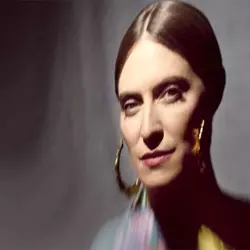 Feist
Feist"It's an aspirational thing to name a dark time a word like Pleasure, to release it to the world as the brother of that experience," says Leslie Feist. The 41-year-old Canadian has just issued her fifth Feist album, indeed called Pleasure. The album is dark, beautiful, heartbreaking, strange, playful, thoughtfully recorded and often shockingly raw, built around live recordings of Feist and Mocky, who together produced the LP with engineer Renaud Letang.
"We were trying to make a live album, with the bulk of songs me alone," Feist explains. "It was only later that we felt we could stand to overdub some things. And those things all felt natural, and like an extension of the songs. I didn't want anything on there to sound like production. I wanted it sound like the cast of characters telling the story. In a play, there's the scene, and there's the people that are required to tell that particular story and bring it to life. And, I look at production like that. It can't be in the way, or self-conscious, or supersede the voice in the narrative; it has to serve the story."
These decisions, Feist said, were made to reflect the songs and the feelings that went into them. "It was raw material; it was a bit rough-around-the-edges, the state-of-mind the songs were addressing," she forwards. "Any romanticised, sweeping strings, that kind of comfort-you-in-its-arms production that makes you wistful, I knew that was just off the table. We couldn't have any of that. The bombastic horn section, that was off the table, too. Because it's so certain of itself, horns are declaring something that they know for sure. But, this album is about the state in between, not knowing one thing from the next, what is up what is down, this state of liminal in-between-ness. We knew that it needed to be pretty bony, and that lends itself to space, emptiness, room-tones, raw natural sounds."
Pleasure arrives six years after Feist's prior LP, 2011's Metals. That album was, Feist now thinks, a reaction against the repetition of touring; a life that she'd thrown herself into at 16, playing with her first band, a Calgary punk outfit called Placebo. By the time she was in her mid-20s, she'd toured around North America numerous times, but never travelled personally. Her first trips to Europe and Australia came when she was performing with Peaches and Gonzales (as sock-puppet-wielding sexpot Bitch Lap Lap). She spent eight solid years on the road around her twin breakout LPs, 2004's Let It Die, which won acclaim and an audience, and 2007's The Reminder, which was Grammy nominated and won iPod ad placements.
Don't miss a beat with our FREE daily newsletter
"I had toured both those records around the world for years, and sung that bank of songs so much that I was determined to not write anything remotely close to them again," Feist admits. "[It was] the sheer physicality of it. My hands and my body knew what the experience of those songs was, so I was interested in veering in a completely different direction."
After touring Metals, she wanted something else: a break. Feist took two solid years off touring because she no longer wanted to think of the road as where she belonged ("it's different every day, so it can be quite discombobulating - and not healthy - when you try to make that shifting place your home"). She travelled personally, visiting Egypt and going to Malawi with an anti-AIDS charity. But, mostly, she was intent on taking a sabbatical. And that meant, with her 40th birthday coming in the middle of a time of contemplation, lots of existential wrangling; thoughts which formed the basis for Pleasure's unsureness, and darkness.
"You know those nights where you just can't go to sleep, and you're staring at the wall, and there's a thousand thoughts flooding your mind, and they're all just noise? That was going on for a long time for me, for a couple of years. I didn't really know what was what. It was like life hadn't added up. Like you stand stock-still and you don't know which direction to take your next step in," Feist offers.
"Like, are you engaged in your own decision-making, or are you just getting tugged around by the patterns that you formed from decisions that you made without thinking in the past? Have those mindless decisions added up to the way your life is now? It's all really existential for sure. And, while it was happening, I couldn't articulate it; I didn't know what the hell was happening. And I felt ashamed of that. I compounded the problem by feeling that this shouldn't be happening and keeping quiet about it. Which only prolonged it even more. I think this is a common problem that people have, but it's just a little bit distasteful to admit it, to broadcast it. And certainly to make an album about it."















